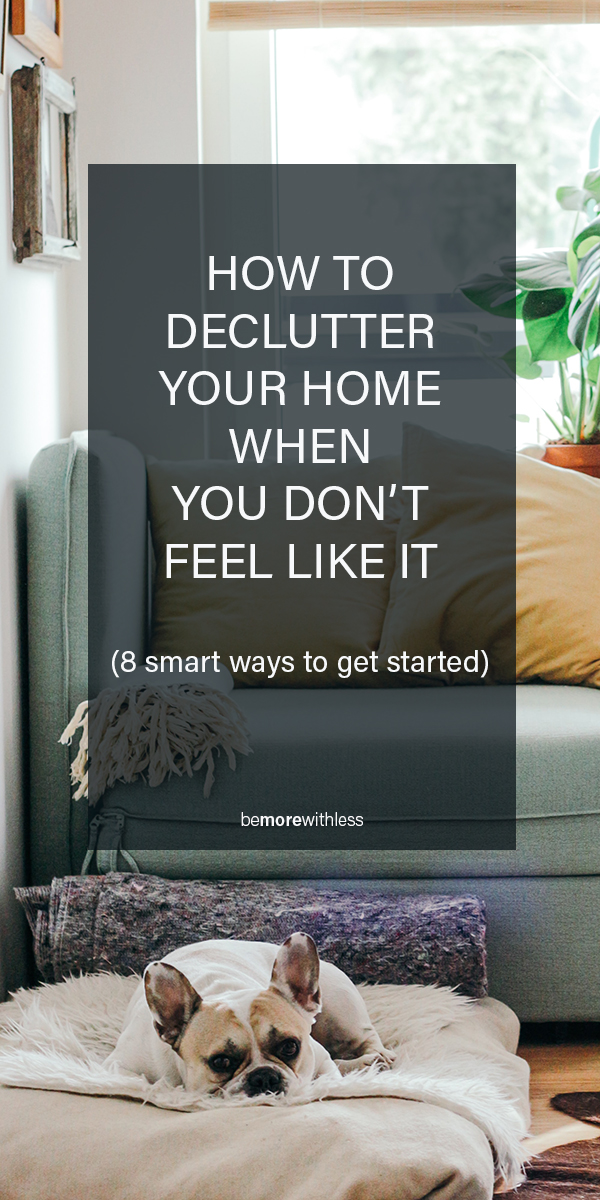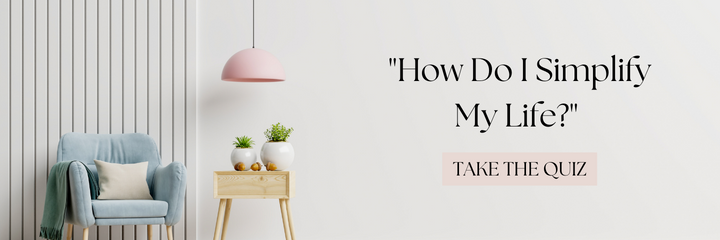The basics of “how to declutter your home” are pretty straight forward. Put clutter in a box or bag and remove it from your home by selling or donating it. But “how to declutter your home when you don’t feel like it” requires more direction, encouragement and inspiration.
You may have to declutter your home when you don’t feel like it if …
- clutter is making you sick.
- you are moving.
- guest are coming over soon.
- you just know it’s time to simplify your life.
- clutter is causing friction in your relationships.
There may be other reasons you have to declutter your home before you are in the mood, or even before you think you have the time and energy to do it. The following recommendations will help and I’m cheering you on! I know it can feel overwhelming if you are just starting to simplify your life AND I know what it’s like on the other side of decluttering your home, simplifying your debt, work, relationships and much more. It’s better. Way better.

How to Declutter Your Home When You Don’t Feel Like It
1. Remember that why is more important than how. We all know how to declutter (and if you aren’t sure, here’s a list of articles to help), but knowing why will make it stick. Why do you want to declutter your home? Why do you want to live with less? Why are you making space — what are you making room for in your life? Consider this thoughtfully or you may find you are just making space for more stuff. Instead, identify your whys and you will make space for more life, not more stuff.
2. Start with a challenge to make it more fun. Finding or creating a decluttering challenge to declutter your home will help you get over the “but I don’t feel like it” hump. Otherwise, you might procrastinate. Below are a few challenges to help you get started but if you get stuck, Psychologist and Procrastination Coach, Dr. Christine Li suggests these 7 easy ways to overcome your procrastination.
- Anti-Procrastination Decluttering Challenge: 10 spaces. 10 minutes. 100 items.
- The Minimalism Game: Find a friend, family member, or coworker who’s willing to minimize their stuff with you next month. Each person gets rid of one thing on the first day of the month. Two things on the second. Three things on the third. So forth and so on.
- Project 333: This closet specific challenge will inspire you to let go in every room of your home.
- Decluttering Burst: Let go of 100 things in an hour. This challenge will definitely help you declutter your home!
3. Declutter your home in stages. Start with the easy stuff to build your decluttering muscles. Items such as duplicates, decorative items, kitchen equipment you haven’t used in years, things that don’t fit, things you don’t use or enjoy, and things in storage that haven’t been part of your life for a long time will be easier to release. Each thing you let go of will give you the strength and motivation to let go of the next.
4. Invite everyone to the party. When you begin decluttering, invite your family to join in. Don’t force, invite. Start with your own personal items. The easiest place to look for clutter is in someone else’s space but resist. Don’t worry about your partner’s closet or your kid’s toys at first. Let family members work on decluttering their own things at their own pace. If you want people to see the joy in less, live joyfully with less yourself. Try a minimalist scavenger hunt to make it more fun.
5 Rethink sentimentality. The last stage of decluttering is usually saved for the more challenging items, including the expensive and sentimental stuff. If the expensive things have no meaning or purpose in your life, sell them, and use the proceeds to pay down debt or donate to a cause you care about.
If you are saving items to pass down to your children, they probably don’t want them. A Washington Post article called “Stuff it: Millennials Nix their Parent’s Treasures” paints a compelling picture for parents who are holding on: “As baby boomers, born between 1946 and 1964, start cleaning out attics and basements, many are discovering that millennials, born between 1980 and 2000, are not so interested in the lifestyle trappings or nostalgic memorabilia they were so lovingly raised with. Downsizing experts and professional organizers are comforting parents whose children appear to have lost any sentimental attachment to their adorable baby shoes and family heirloom quilts.” In other words, your kid’s don’t want your stuff, so you can let go of it now. If you aren’t sure, ask them and believe what they tell you.
P.S. If your adult children want your stuff or their childhood memorabilia, give them a pick up deadline. It’s not your responsibility to store it for them.
6. Honor the pace that is best for you. Unless you are in a situation where you have to declutter your home quickly, honor the pace that is best for you. If you aren’t feeling well, rest. If you need help to declutter your home, ask for it. If your time and energy availability are low and it takes longer to declutter your home, that’s ok.
7. Trade guilt for gratitude. If you struggle with guilt about letting go, holding on, money spent, or time wasted, it’s time to shift every guilty thought to one of gratitude. If you are thinking, “I shouldn’t have spent that money?” trade your thought for “I’m grateful that I recognize what’s most important to me now.” Allow your guilt to trigger gratitude and move one thought at a time from guilt to gratitude, because you have paid enough.
8. Celebrate your efforts. Declutter your home, or a room, or even a corner of the room, and celebrate. If you decluttered your kitchen, host a small dinner party. If your idea of celebrating is turning on music, grabbing a good book and relaxing in your newly decluttered space, do that. You deserve to celebrate your efforts in a way that resonates with you. Don’t wait until you completely declutter your home. Instead, celebrate along the way. It will make you excited for the next celebration.
If you are still feeling overwhelmed or confused about the benefits of decluttering, simply remember that your home is not a container for your stuff, but rather a place for joy and connection. I can’t think of a better reason to declutter than to make room for more of that.

